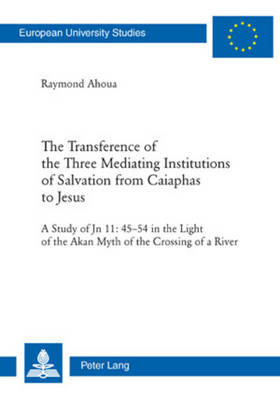Europaeische Hochschulschriften / European University Studies / Publications Universitaires Europeennes
1 primary work
Book 853
The Transference of the Three Mediating Institutions of Salvation from Caiaphas to Jesus
by Raymond Ahoua
Published 9 September 2008
"It is better one man dies than the whole nation perishes" (Jn 11: 50). Caiaphas' sentence goes beyond ethical principles and religious expectations. It appears as the saying of a cynic politician. Besides, it is seen as the perfidious advice of a corrupted high priest to the members of the Sanhedrin. Who is this man on whose saying a school is formed? Who is this man who played the most important role in the death of Jesus? Indeed Caiaphas' sentence gives rise to the following relevant question: is the prohibition of killing (Dt. 5: 17), even the killing of a single individual in order to save a whole nation, legitimate? Thus, many issues that are associated with this high priest are associated with Jesus.
The book is mainly an exegetical and comparative analysis of Jn 11: 45-54 and the Akan myth of the crossing of the river. By providing new theological insights into Caiaphas link to Jesus' death, it gives pertinent answers to the above questions.
The book is mainly an exegetical and comparative analysis of Jn 11: 45-54 and the Akan myth of the crossing of the river. By providing new theological insights into Caiaphas link to Jesus' death, it gives pertinent answers to the above questions.
